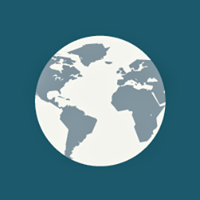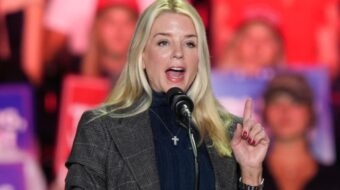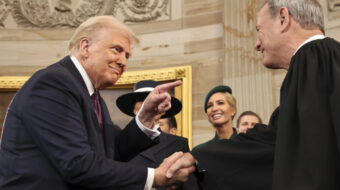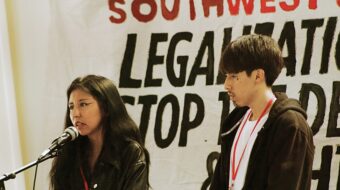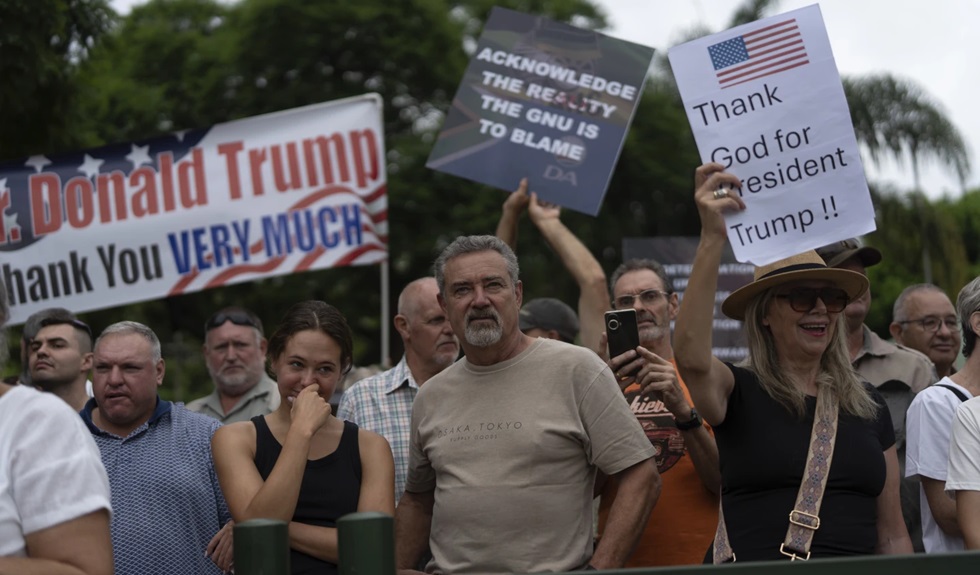
In a virtual discussion hosted during African-American history month earlier this year by the Communist Party USA, Dr. Rob Davies, former South African trade minister and a member of the South African Communist Party, delivered a stark warning about tech oligarchs’ growing influence, shifts in U.S. politics, and the targeting of South Africa.
Early on in the second Trump administration Davies was already out front, pulling no punches as he linked billionaire figures like Elon Musk to sweeping changes in governance and economic policy, not through democratic means but via outright and undisguised corporate dominance.
Davies opened by highlighting the irony of discussing Musk and Trump, two non-Black super-rich oligarchs, during Black History Month in the U.S. “Some of these characters are greatly influenced by the most reactionary and backward pro-apartheid forces in South Africa,” he said. He warned that the rapid changes occurring under Trump were part of a larger attempt to redefine global power structures.
South Africa under attack
A major focus of the discussion was the U.S. offensive against South Africa, which Davies said was driven by a mix of imperial ambition and right-wing ideological alignment. Trump’s February 7 executive order cited three main grievances:
- South Africa’s Expropriation Act, which right-wing groups have mischaracterized as a radical land grab.
- South Africa’s role in the International Court of Justice (ICJ) case accusing Israel of genocide in Gaza.
- Alleged increased cooperation by South Africa with Iran despite little to no evidence.
The consequences were immediate. The U.S. halted all financial aid to South Africa, a move that particularly threatened the President’s Emergency Plan for AIDS Relief (PEPFAR), which funds critical HIV/AIDS treatments. “There were pictures on television of people going for their ARVs [anti-retroviral drugs] and being told that the clinic was closed,” Davies reported. Though the freeze has been temporarily delayed, its potential reinstatement looms large.
Adding fuel to the fire, Trump also announced that white South Africans identifying as Afrikaners would be given priority in the U.S. refugee program. According to Davies, this plays into the hands of far-right South African groups like AfriForum, which have successfully courted U.S. right-wing think tanks to further their cause.
Predicted Trump’s trade war
Beyond direct aid cuts, South Africa was already facing this past Winter the possibility of being axed from the Africa Growth and Opportunity Act (AGOA), a trade program that provides duty-free access to the U.S. market for African exports. Davies explained that South Africa was the biggest user of AGOA, exporting billions in goods like cars, minerals, and agricultural products.
“If we had to pay 2.5% [duty on passenger vehicles] instead of zero, presumably we’d still be able to get vehicles into the U.S. market… 25% would cut us out [of the market],” he warned.
The Trump trade war has, of course, unfolded in a manner worse than most had predicted.
AGOA was initially billed to encourage economic growth in Africa, but Davies said the U.S. maneuvers exposed it as another tool for economic warfare. With removal from it and with the attacks on the viability of South African trade, the economic consequences will reverberate beyond its borders, affecting supply chains and industries across the continent.
Cracks in U.S. dominance
Stepping back from the South African perspective, Davies painted a picture of a global order undergoing profound shifts. The days of unchallenged U.S. dominance are fading, he argued, replaced by a world where China and Russia are asserting their own spheres of influence. “China has emerged as a peer competitor and [is] probably likely to be the world’s largest economy… Russia… has prevailed in the imperialist proxy war in Ukraine,” he stated.
Facing these challenges, the U.S. is pivoting from traditional military interventions to aggressive economic measures, including sanctions and trade restrictions, Davis said. The goal? To contain rising competitors and maintain influence where military force has failed.
Rules for thee, not for me
For decades, the U.S. was the chief architect of global trade rules, enforcing neoliberal policies that favored American and Western European interests. Now, it is the first to abandon them when they no longer serve its agenda. Davies pointed to the U.S.’s unilateral tariffs and industrial subsidies as clear evidence of this shift.
However, this reversal is opening unexpected opportunities for the Global South. Countries like Indonesia are exploiting loopholes in the World Trade Organization (WTO) system to implement policies that promote local industry.
Davies explained that Indonesia was able to ban the export of raw nickel to force foreign companies to invest in local processing. When the European Union challenged the move at the WTO and won, Indonesia simply appealed—but because the U.S. has blocked new appointments to the WTO appeals body, the ruling is unenforceable.
What comes next?
Davies speculated on what U.S. foreign policy could look like under a second Trump administration. He suggested that economic warfare would take center stage, replacing military invasions with financial blockades, trade restrictions, and technological controls.
“I don’t think they’re gonna go into China and try to start a war with China based on Taiwan,” he said. “It’s going to be much more aggressive economic warfare, sanctions, embargos—deals of one sort or another.”
Trump has already hinted at pursuing a trilateral nuclear arms reduction deal with China and Russia, a move that would mark a dramatic shift from previous U.S. policy. Meanwhile, the Western Hemisphere is becoming a key battleground, with the U.S. intensifying pressure on countries like Panama and Mexico to ensure they remain within its orbit.
Elon Musk and the future
At the center of the internal U.S. shake-up is Musk, who has taken on a prominent role in restructuring the state. “Tech oligarchic capital, in the name of Elon Musk, is driving a profound restructuring of the U.S. state apparatus,” Davies argued. He described how Musk is pushing for massive deregulation, AI-driven governance, and a dismantling of social programs, all under the guise of “efficiency.”
“[DOGE] is actually using that term to drive austerity and also to drive opportunities for digital capital to accumulate,” Davies warned. He pointed to Argentina as a test case, where President Javier Milei has enacted deep social spending cuts, leading to economic upheaval and rising inequality. Musk is leading a U.S. version of this approach, which will likely be exported to other nations as well.
Resistance to imperial overreach
Davies ended on a call for global resistance against economic imperialism. He urged progressive movements in both the U.S. and South Africa to challenge policies that enrich billionaires at the expense of working people. The battle against economic domination, he argued, is one that must be fought on an international scale.
As the Trump administration, with figures like Musk at its helm, advances its agenda, the question remains: Will the world resist, or will it be forced to adapt to a new era of corporate-controlled governance?
We hope you appreciated this article. At People’s World, we believe news and information should be free and accessible to all, but we need your help. Our journalism is free of corporate influence and paywalls because we are totally reader-supported. Only you, our readers and supporters, make this possible. If you enjoy reading People’s World and the stories we bring you, please support our work by donating or becoming a monthly sustainer today. Thank you!


